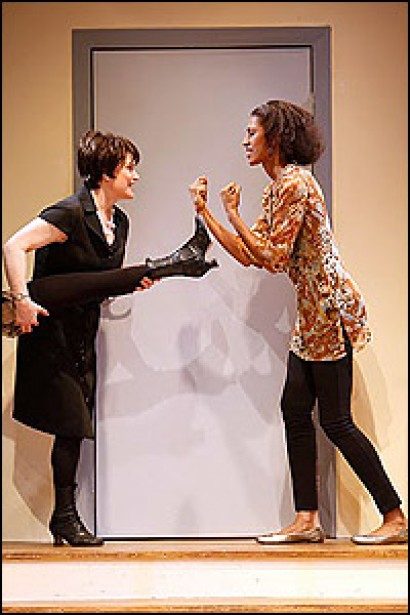There is nothing that teaches me more about acting than theater.
If things are funny when they are supposed to be, sad at the right moments, it is a beautiful meeting point of writing, directing, acting and production.
When the production is flawed I ask, “Who messed up?”
My mother always blames the actors. Although she doesn’t get to theater much she is an avid TV watcher. According to her perspective as a RN for twenty years, Edie Falco is the devil for portraying a pill-popping nurse. “Like weer awl on drugs?”
Before I became an actor I followed that judgment pattern. Now I know better.
Last Friday I saw “Bass For Picasso” at the Kirk on Theater Row. Written by Beebo Brinker Chronicles writer Kate Moira Ryan, it portrays a volatile dinner between a one-legged lesbian food writer, alcoholic playwright, euro-trash sex-pot, overworked ER doctor with a meth-addicted husband, and a lesbian mother about to loose her son to her deceased wife’s political infamous Republican parents. People get angry, very angry, and everyone leaves devastated. The only one who escapes unscathed is the euro-lesbo, mostly because she doesn’t really understand anything going on around her.
Quirky characters in complex scenarios are often funny, but people seldom laughed in this portrayal. The tension between characters was not evident and/or compelling, except for the ER doctor and his husband, who we never see and who finally rings at the door to end the play.
“Who messed up?”
I wanted to defend my fellow thespians and thought of all the reasons everyone else put them at a disadvantage. Maybe if the timing had been directed differently the writing would have had the affect it intended? Or, if the costumes were tweaked appropriately it could have helped things appear more smooth. However, I had to admit that different casting choices would have enormously changed the fabric of the play.
The most apparent aspect of “Bass with Picasso” is its inclusion of a disabled character in a real way. It was a part of the character, a given, a quirk; not a plot point to heighten dramatic tension. At first seeing a one-legged person onstage with an obvious prosthetic was jolting, because I have never seen a disabled person on stage — ever. But, the play required me to get over myself and by the end, when she took off her leg and smacked her girlfriend with it, it wasn’t alarming, just funny.
Perhaps it is more productive to think about that positive. No one messed “Bass for Picasso.” The final result of the play was to give seldom-seen characters time in the NYC stage. And to change the audience members expectations of who can be on the stage. It is a great starting point for future productions.
